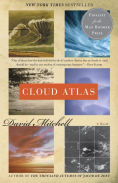This was exactly the book I needed to read right now! I’ve tried to read it before and given up after twenty or so pages, bored by the lack of a story question and disliking the characters. Still, my friends persisted in telling me that it was a great book and I would love it. They were right.
We start with the story of a notary sailing from the Chatham Islands home to California in 1850. His travails with the rough sailors and their captain are somewhat ameliorated by his friendship with a doctor who promises to cure him of his rare disease. From there we move to the story of an irresponsible young composer in 1931 Belgium, who has wasted his inheritance and tricked his way into the home of an aging and infirm yet still famous composer. Then we are on to others, moving forward in time to the present and beyond.
The structure reminds me of “Menelaiad”, a short story by John Barth. As we go further into the nested tales, the sequence of quotation marks increases. Then as we go back out they decrease. I once heard him read the story and he used a flip chart to show the growing series of quotations marks and then flipping back as we came out. I don’t want to pre-empt your own discovery of how Mitchell’s structure fits this story, so will not say more, only that you will not be disappointed.
Each of Mitchell’s eras is written in a different style: a journal, an epistolary novel, a genre mystery, etc. It’s masterful writing! Ian McEwan did something similar in Atonement, writing each section in a style that reflects a popular literary style of the period.
Like Margaret Atwood’s The Handmaid’s Tale, Mitchell story takes things—ideas, trends, prejudices, movements—that we can see happening in our society today and carries them to a logical outcome, with an equally terrifying result. There was nothing in here that made me think, “That will never happen.”
I don’t want to give too much away. I can only tell you that I came away feeling both frightened and reinvigorated. More confident than ever in my path, I set aside discouragement and depression and put my shoulder to the wheel again. Thank you, David Mitchell. I will never forget what you have done here.
Is there a book—fiction or nonfiction—that you’ve read that gave you courage?
